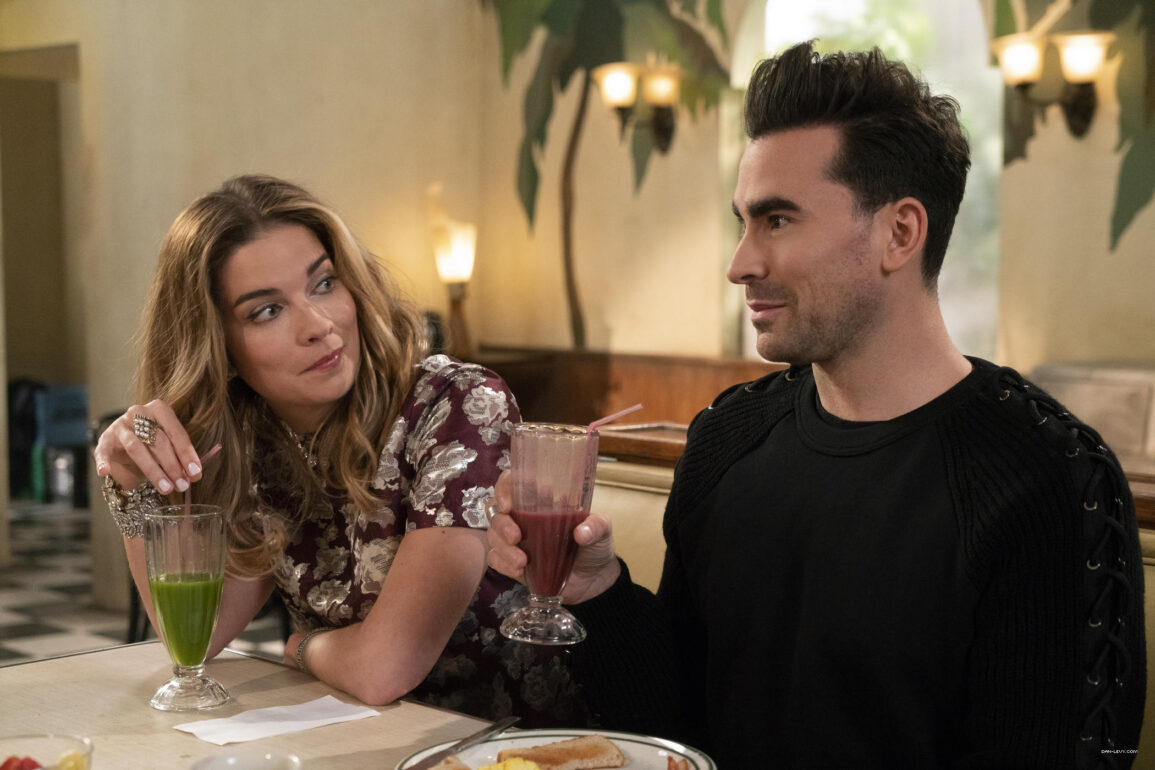Schitt’s Creek opens up with the climax: The Rose family is tricked and looted by their business manager and has lost everything. Someone is taking their family portrait away, others are removing their expensive statues. The lawyer explains that the Government has allowed them to retain one asset: a town that Johnny Rose bought as a joke for his son. Falling from grace, this town will ultimately become the Rose family’s “saving grace” in more ways than one.
Realization of ‘family above all’
Schitt’s Creek’s origin story lies in a very pertinent question of our times, a concept which the creator Dan Levy was thinking about: “Would the Kardashians still be Kardashians without their money?” America is obsessed with the idea of a ‘perfect family’ and family values – something which the Kardashians capitalize upon as they turn their family name into a brand itself. Their crass materialism reflects the worst this culture can do to us. That worst is mirrored in the Rose family who display vanity, narcissism, greed, and selfishness. Roses have always acted like a family, the giant portrait of the four is an example, but they learn to be a family only later.
The crisis is the bedrock where one develops one’s sense of what genuinely matters. It is in plight people seek out each other for basic human needs. Rose’s struggle is not only their change of place: mansion to the motel but also the change of values: conceit to compassion. Being forced to live in Schitt’s Creek, they did not only have to adjust with the people of the town but with each other. What initially felt like a daunting task made them realize where their true fulfillment really lies.
Alexis (Annie Murphy) later admits, “A part of me feels like I’m almost glad that we lost the money.”
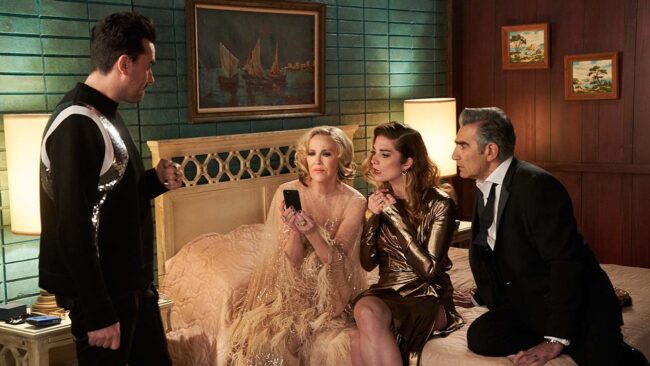
When the show begins, the family is unable to cooperate. Each one of them is finding a way to leave the place. By the end of the second season, they articulate their love for one another as if they are initial learners in the art of expressing normal human emotions. They dance together in a barn and for the first time are a family. The evolution of David, Moira, Johnny, and Alexis is a very gentle and hopeful reminder that people can change and learn to love each other. They part with their giant family portrait not only because it doesn’t fit in their motel room but also because it doesn’t fit in their life. It represents artificiality, superiority, and vanity. None of which they can relate to anymore.
The Ideal Small Town
However, the true humanity of the show lies in the land of Schitt’s Creek itself. It is a land of optimism and love that lacks any pretentiousness or moral superiority. When the Rose family arrives in the town, they are neither judged nor gossiped about. Their unfortunate story is met with empathy and concern. Coming from affluence and wealth, it is the Roses who bring in judgment, condescension, and orthodoxy in their views towards the town dwellers. It is when they stop thinking about where they should be, they discover true affinity. It is seen in Johnny defending Roland (Chris Elliott) and his wife, Jocelyn (Jenn Robertson) from their rich, snobby friends. It is the first time Johnny (Eugene Levy) and Moira (Catherine O Hara) are able to distance themselves from the trappings of the class.
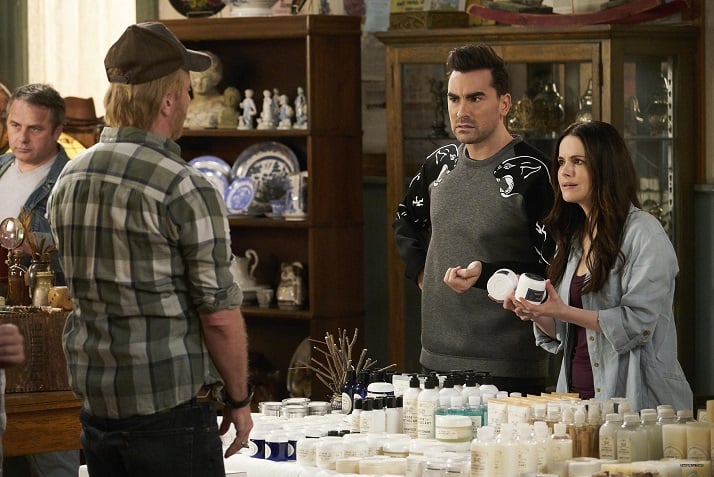
There is a brilliant metaphor used by David (Dan Levy) to explain to Stevie (Emily Hampshire) that he is pansexual: “ I do drink red wine. But I also drink white wine. And I’ve been known to sample the occasional rose. And a couple of summers back I tried a merlot that used to be a chardonnay, which got a bit complicated…I like the wine and not the label. Does that make sense?” The metaphor takes a larger reflection of how a utopian world will look like: acceptance, inclusion, and lack of judgment.
Importance of Human Interdependence
The show drives home the message that true acceptance and respect, devoid of ego and malicious intent, have the power to influence both parties. Just like Roses learn something from the people living in Schitt’s Creek, so do they. Stevie Budd, the hotel manager, acts as an outside/audience perspective. She is curious and asks questions to the family which the audience is wondering about. She quietly judges them but also derives fun from them. In her bleak and dull existence, they are pure entertainment. This is how I perceived the show as well. It was last year, in 2020, amidst the pandemic when I discovered the series. During the initial episodes, I considered it as yet another comedy. But later as I find out, like Stevie, that there is so much to learn about Roses than what initially meets the eye.
Stevie, in some ways. is a mirror image of David. Witty, cynic, and insecure, David is the first true friend of hers and vice versa. With the help of Moira, she is able to come out of her shell and self-doubt and perform in cabaret. The performance of “Maybe this time” is powerful and empowering for Stevie because this is her triumph over her inner demons which tell her she is not good enough. Her relationship with Johnny Rose is heartwarming and vulnerable at the same time. Their partnership over the motel is a gift for both of them. It makes Stevie want to do something with her life and gives Johnny a way to rebuild his own.
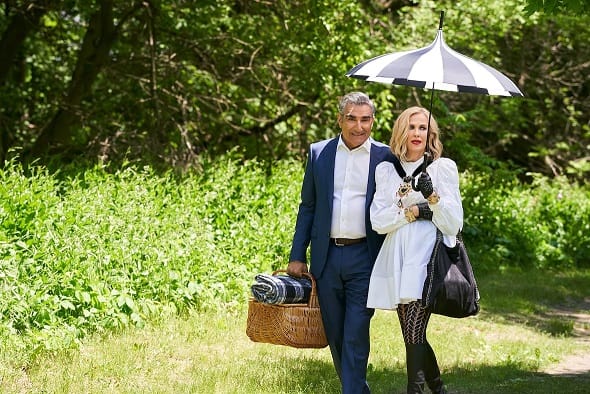
The romance between David and Patrick (Noah Reid) is the central part of the show. Just like David learns to trust people again through Patrick, Patrick is able to come out of his closet. David has only been in relationships that have made him feel bad about himself. Struggling to fit in, it is Schitt’s Creek that gives him that regard. He wanted to go to New York and prove that he “won” but realized that the best things in life are not meant to be flaunted.
In a similar vein, the initial relationship between Ted and Alexis remains largely superficial as Alexis shows interest in him only to cure her boredom. It is through staying apart and loving him again, she is able to overcome her self-centered nature and listen to her heart truly. This lead Alexis to gain a diploma and also suffer from her first heartbreak. In her 30s, Alexis is beginning her journey. Always the object of male desire, she realizes that she can do more with her life and be independent. In a deeply moving scene in which she and Ted (Dustin Milligan) are breaking up, she chooses herself and her dreams. One can say, it is for the first time Alexis truly chooses herself.
The Show Speaks to Times of Pandemic
There are countless times in the show when the characters stand up for each other. Because standing up for each other is standing up for yourself. The evolution of these characters is not overnight, but slowly and rightfully gained. Their growth is not them shedding away their selves but in fact, coming closer to its authenticity. Several people have rightly pointed out how Schitt’s Creek speaks to our present times of pandemic. Just like us, Roses were locked away in a motel. And just like us, they were adjusting to the “new normal.” The forced togetherness with the family was frustrating at times but also made everything survivable.
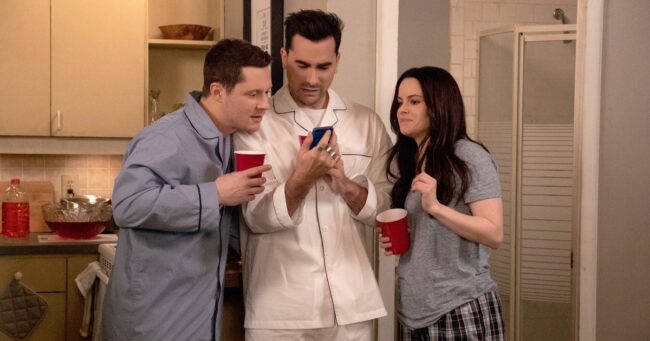
Schitt’s Creek focused essentially on the redeeming qualities of people around and how their genuine emotions are what makes them human. It tells us that when you confront, and not deny, the reality that you are able to give space for a new and better life to start forming. It is an indication that sometimes when life seems to be taking a wrong direction, it is actually taking a different route. It stipulates that growth can look like a stop. And assures us that sometimes when you are losing, you might, to tell the truth, be winning.

